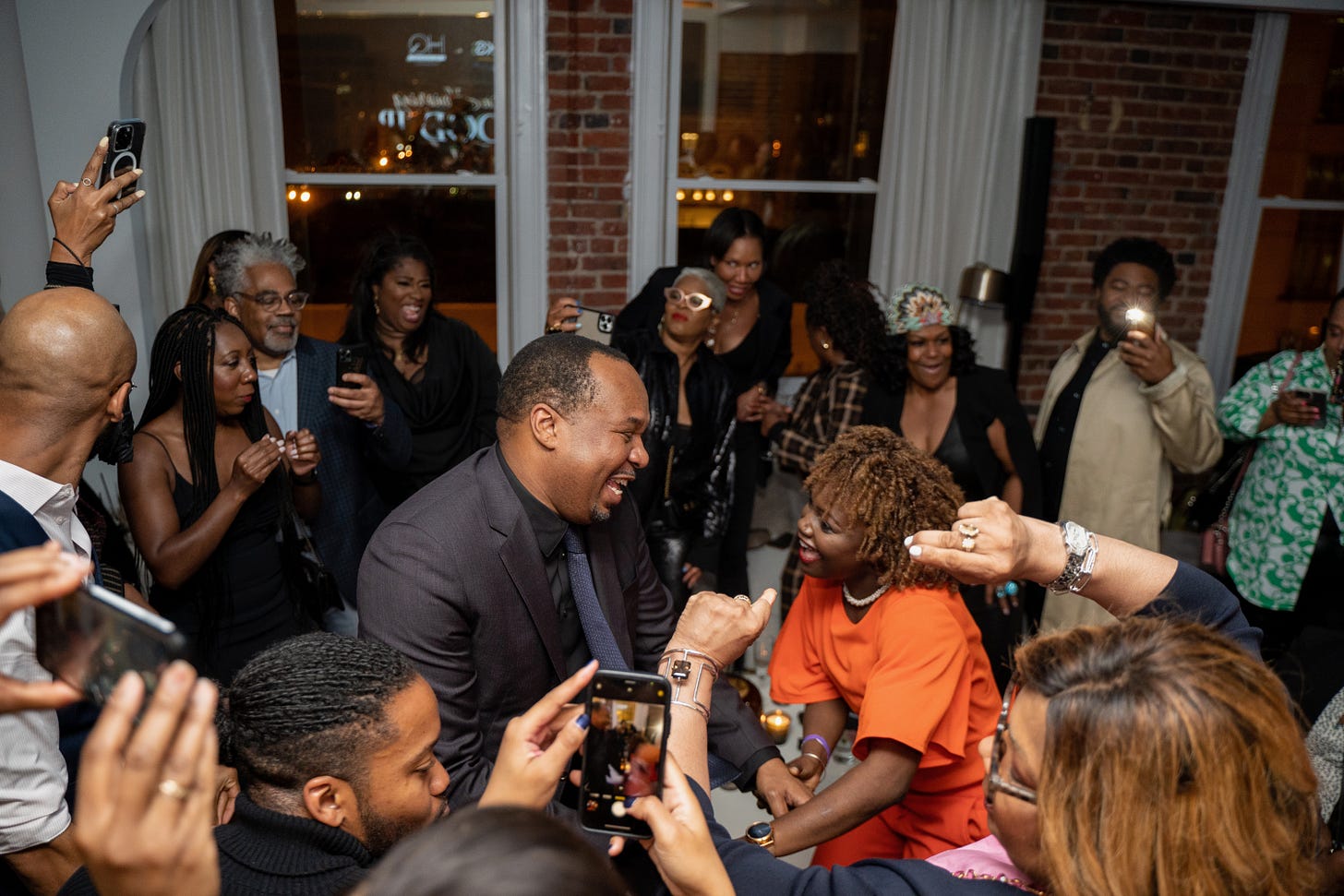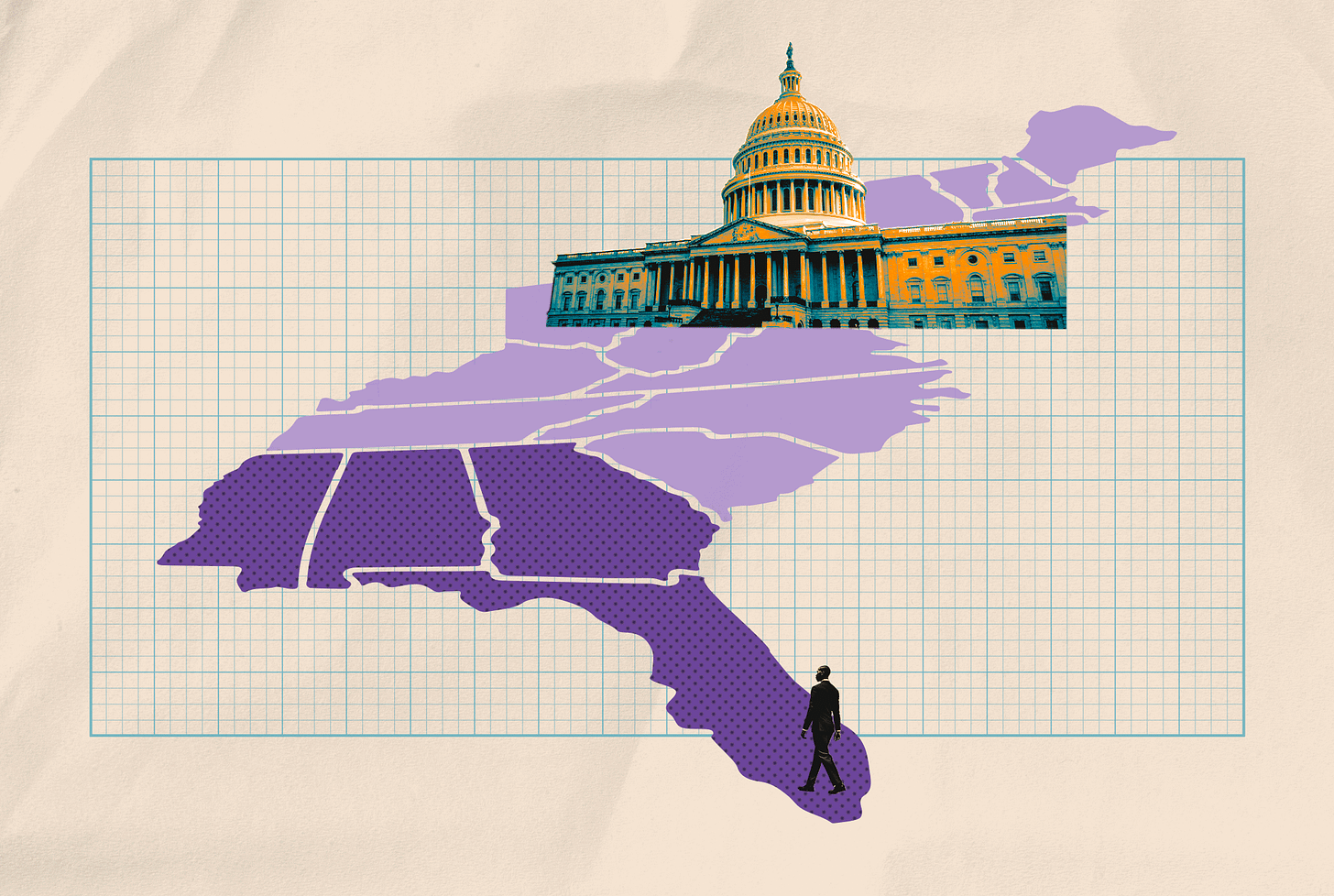In the nation’s capital, the South’s got something to say
Black politicos in Washington are lifting each other up, and looking back to their roots.
The night before the White House Correspondents’ Dinner — one of the whitest events you’ll find in Washington — Roy Wood Jr. spent the evening celebrating with Black Washington.
The host of this year’s dinner was being honored with a reception called Correspondents for the Culture at the HQ DC House, a Black-owned private membership club, where its attendees were able to let their hair down, a stark contrast from the otherwise stuffy environments they regularly find themselves in.
White House Press Secretary Karine Jean-Pierre made a grand entrance, strolling into the middle of the dance floor, taking off her orange blazer and dancing to Fatman Scoop’s “Be Faithful.” Don Lemon, who was fresh off an unceremonious firing from CNN, was taking photos and listening to concerned admirers tell him how they felt about the way his former network handled his exit. Longtime White House correspondent April Ryan was chatting it up with partygoers. Education Secretary Miguel Cardona was seen conversing with guests at the bar.

The event was a microcosm of Black Washington, one of the several groups that exist within the boundaries of the nation’s capital. As Wesley Lowery described, there’s “Official Washington,” the white professional class that resides in northwest D.C., Capitol Hill, and Georgetown, and there’s the “District of Columbia,” made up of majority-Black, working-class area natives. And then somewhere in the middle, you’ll find “Black Washington,” the professional class of Black transplants who live day-to-day as political operatives, reporters, executives and lobbyists.
This particular event was for Black Washington. But there was a theme throughout the night that could not be missed: this wasn’t just a celebration for Roy Wood Jr., the comedian. This was a celebration for Roy Wood Jr., a Birmingham native and graduate of Florida Agricultural and Mechanical University.
The son of a historically Black university was about to roast President Joe Biden on the biggest night in Washington, and Tasha Cole, who organized the Correspondents for the Culture event alongside Black Washington figures Erica Loewe and Vincent Evans, wanted to celebrate exactly that.
Cole, the first chief diversity officer for the Democratic Congressional Campaign Committee, didn’t know Wood, Jr. personally before the Correspondents for the Culture party. But as two Southerners who both attended FAMU, there were essentially zero degrees of separation between the pair. Cole wanted to host something special for the comedian to acknowledge that Wood had a unique platform to speak to some of the most influential people in the country.
“I was committed that this Rattler was going to come to the political capital of the world, speak to the largest and most influential political leaders on their night. We should acknowledge it. That should be acknowledged,” Cole said. “The culture needed to know that he was not only a Black man, but an HBCU grad.”
The event, she added, “was a way to center us, center our culture, and our story during a week that traditionally had not seen our voices.”
“FAMU has built several generations of bad brothers and sisters, particularly in government and politics and advocacy,” said Vincent Evans, executive director of the Congressional Black Caucus. Part of the Florida university’s rich legacy stems from it “being deeply steeped in the South. It molds you in a way that has a lasting impact,” he continued.
The South’s presence at the party could be felt through the drawls of some of the attendees' voices and the warmth that filled the room. This energy can be a useful tool in the halls of the Capitol where building relationships is key, said Kamau Marshall, senior advisor at the U.S. Department of Education.
“[Southerners] understand cultural competency, but more importantly, they know the power of relationships. I can't just say only the South knows how to do that, but I feel the South does a better job at maintaining those relationships,” Marshall, who has lived in Alabama, Georgia and Texas, explained.
“The Southern charm will never go out of style. Being respectful, understanding people, listening to people … More than anything, a Southerner can be their true self. And people feel that warmth from a Southerner.”

Advocacy is in the DNA of the Southerners who decide to do this work. Their parents, and for some, grandparents, were active in the civil rights movement, participating in nonviolent protests like the Montgomery Bus Boycott, civil rights campaigns and helping to register Black voters in the southern states. Those who’ve moved to Washington from the South see working in the nation’s capital as an opportunity to ensure the people and the towns they hail from are represented in the halls of power.
“A lot of us, particularly the people in this town, particularly from the south, got into this work because we grew up in an environment of advocacy,” said Erica Loewe, director of African American Media for the Biden Administration and Florida native. “A lot of the advocacy work that you see [in D.C.] derived from the South, whether it was an issue that took place there or an organization that developed as a result of it. A lot of the work that we do now that we're passionate about is because we grew up around it.”
Vincent Evans, who hails from North Florida, agrees. He believes that growing up in the South gave him a unique perspective that helped to shape his worldview.
“Being from the South puts in you a sort of fight because you know there are people counting on you. The fact that in 2023, we are still having debate over whether or not slavery was beneficial to Black people … these types of stories have a way of shaping your worldview,” said Evans, who also served as southern regional director for Biden’s 2020 campaign. “You can allow it to either be something that makes you angry, or you can use it as a way to fight. That’s what it did for me.”

Obviously, Southerners are not new to the Hill. After the passage of the Voting Rights Act in 1965, Black voters flooded the polls to elect representatives that actually represented them. Andrew Young of Georgia, John Lewis of Georgia and Barbara C. Jordan of Texas were just some of those elected after its passing. And then there was the “Class of ‘93,” the year an influx of Black Congress members were sworn in from Texas, the Carolinas, Mississippi, Alabama, and more — some of whom are still active today, like Jim Clyburn (D-S.C.) and Bennie Thompson (D-Miss.). And these members often brought Black people from their states along for the ride as staffers.
Many of these politicos launched their careers by being in the orbit of those Black members of Congress.
“So many of these leaders from the South have been able to give a generation or two of young Black kids an opportunity to come to Washington on fully paid internships with housing and stipend, scholarships, and then get full-time jobs. They have, over the last 30 years, changed the trajectory of a lot of people's lives. My own included,” said Evans, who credits his former boss Rep. Al Lawson (D-FL) with changing the trajectory of his life.
Jamie Harrison, chair of the Democratic National Committee, a mentee of Rep. Clyburn, is another example. Trey Baker, a Mississippi native and a partner at the law firm Barnes & Thornburg, was formerly Thompson’s legislative counsel.
“When you look at our sphere in Mississippi, so much of it is attached to the 30 years that Rep. Thompson has been in Congress,” Baker explained. “You look at someone like Derrick Johnson, the president of the NAACP, he was a staffer for Congressman Thompson. You look at Shirlethia Franklin, who was chief of staff to Loretta Lynch; she was a staffer for Congressman Thompson.”
“Having leaders who looked back to the South and understood that there were people who understood the issues there and that we should be able to bring those people to Washington … that was our foothold. Now we look back to Mississippi and Alabama and Georgia and Arkansas in order to give other people that same kind of foothold.”
The current Congress is the most racially and ethnically diverse to date in terms of House and Senate members, according to the Pew Research Center. A recent Senate Diversity Initiative survey providing information on diversity statistics for Democratic Senate offices found that 20% more Black Americans work on staff than when the first survey was conducted in 2017.
People of color make up about 18.3% of director-level staff, according to analysis from the Joint Center for Political and Economic Studies, but there’s still much work to be done to ensure congressional staff diversity accurately reflects America.
Black Capitol Hill staff have long called out the issues they disproportionately face, including Washington’s high cost of living, low wages for long hours, and lack of the built-in connections their white counterparts may have. “There still is not enough opportunity for young Black people on the Hill despite these wonderful colleagues of mine who are spread far and wide across the city,” said Nicole Varner, chief of staff for Rep. Marc Veasey and Birmingham, Alabama native.
According to Varner, one of the most important things Black Southerners that work in this space can do is to mentor the next generation.
“There are consistently kids coming up, not just from the South, but across the country to work here, who want to be here, who want to do a good job,” she explained. “But for any young person reading this, just reach out — send a cold email, mention this article — because the problem is we don’t know they’re there until we know they’re there.”
“In the words of Andre 3000, the South got something to say. And we're saying it, and we're doing it,” Varner said. “We are working to prepare the next generation of young Black people.”





